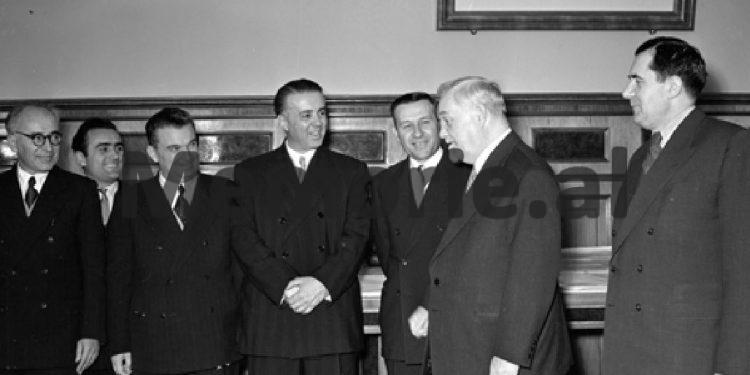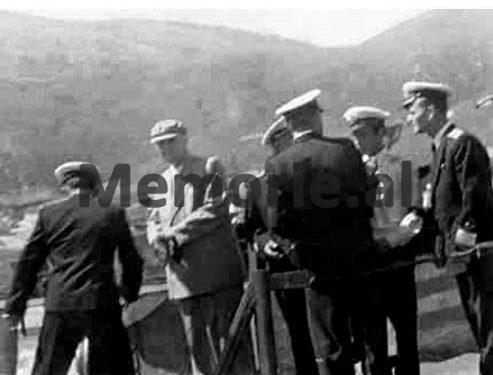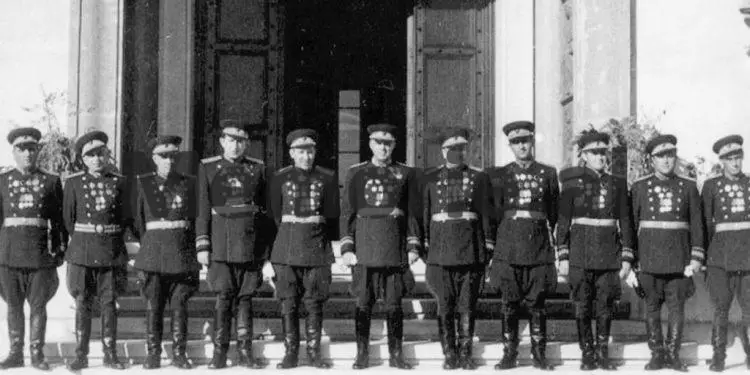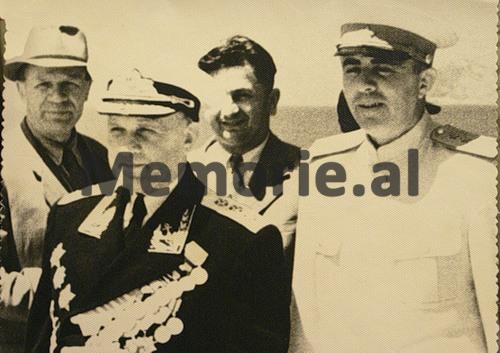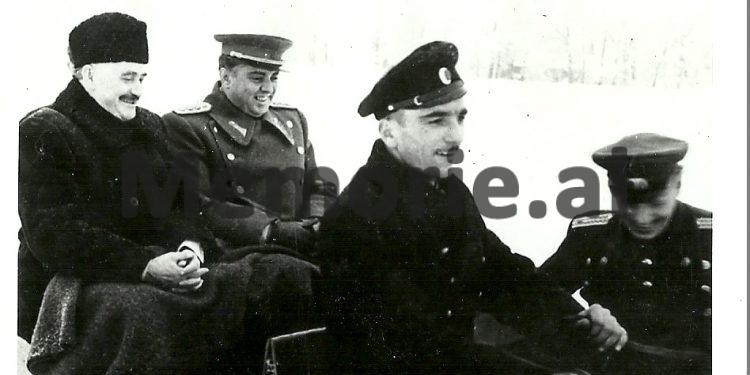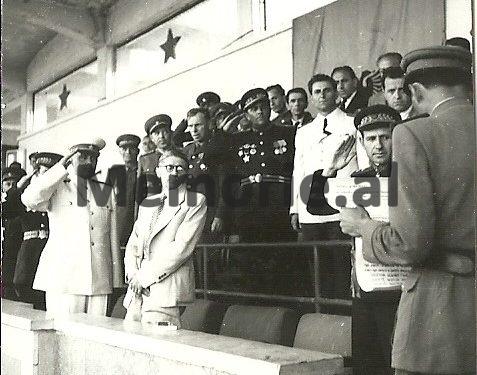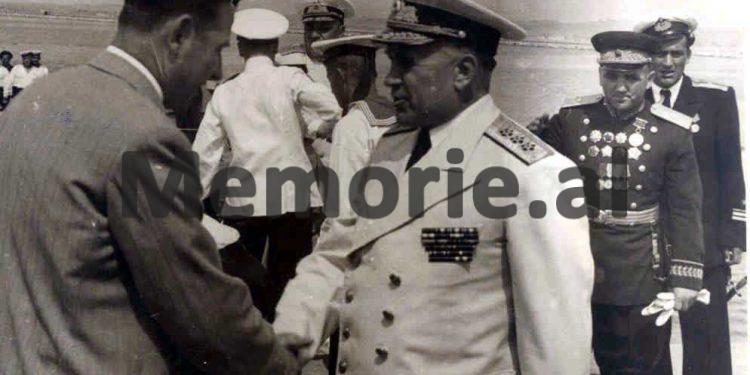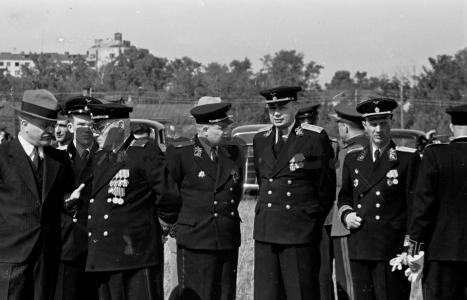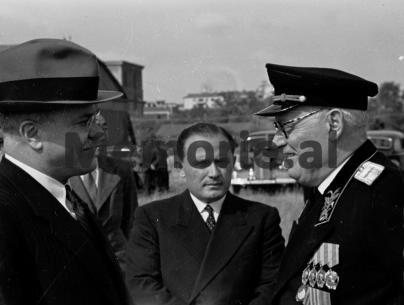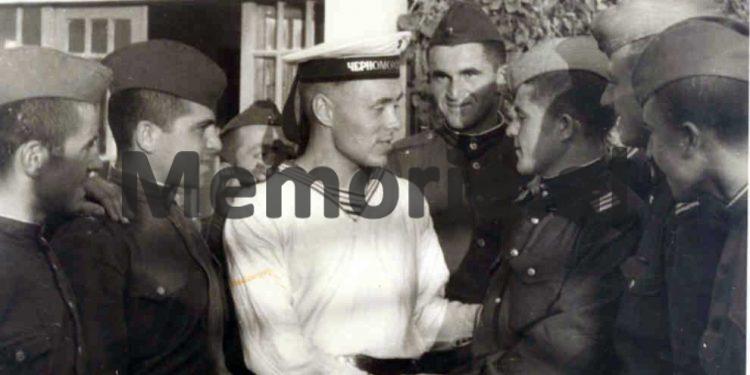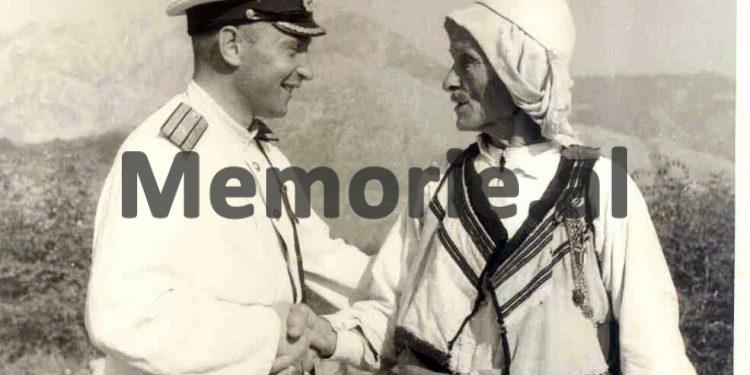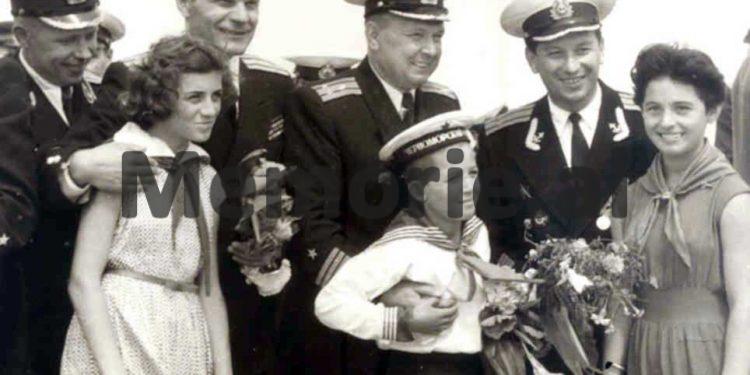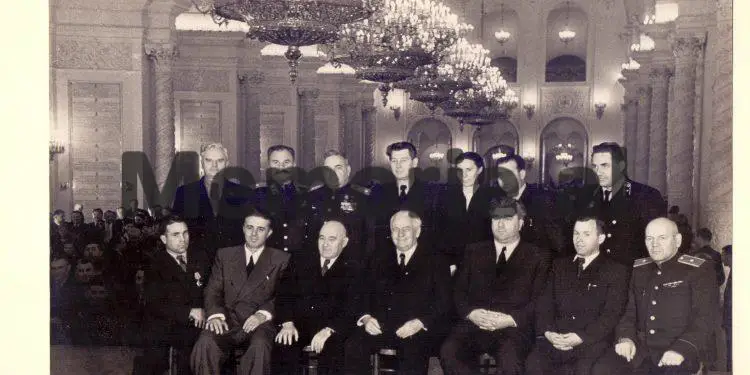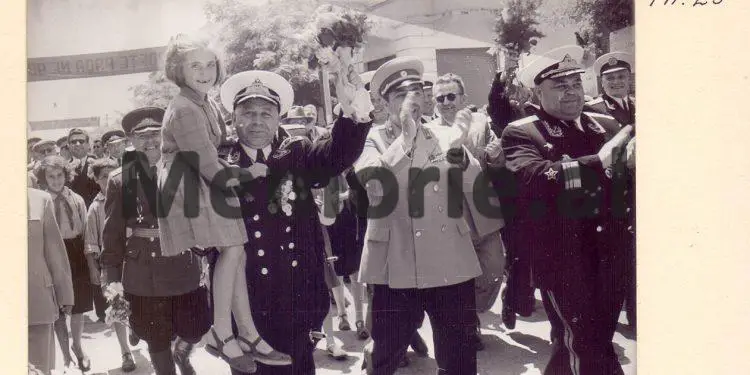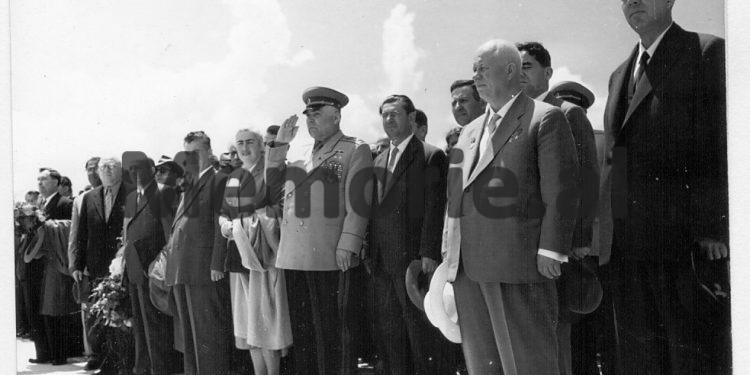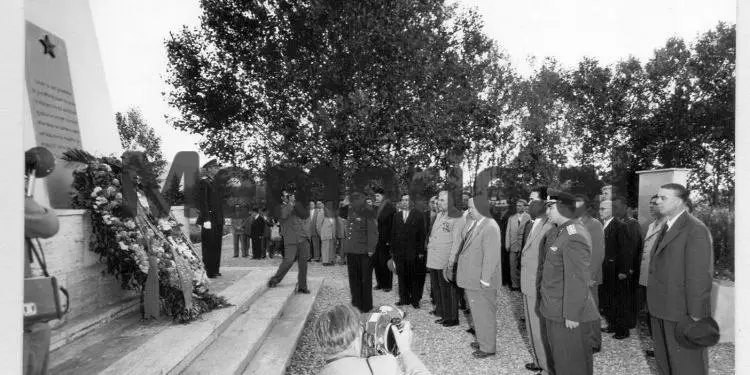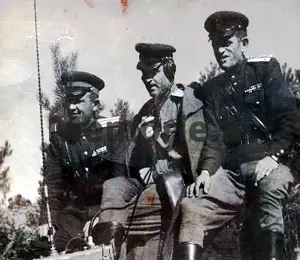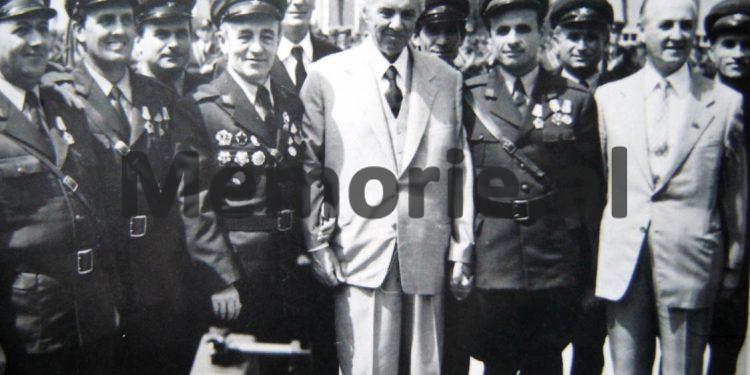Dashnor Kaloçi
Memorie.al/publishes the unknown history of communist Albania’s relations with the former Soviet Union in the military field since 1955 when official Tirana signed the accession to the Warsaw Pact where most of the countries of the Communist East were, or as they were known otherwise “People’s Democracies”. Testimonies of Colonel Skënder Malindi, former Director of Army Combat Training at the Ministry of People’s Defense, who recounts how relations between the Soviet Union and our country developed at that time, starting with the supply of weapons of all kinds that The Soviets brought for the Albanian army (tanks, artillery, aircraft, submarines, location, etc.), visits of Soviet military delegations to Albania and the Albanian ones in some places of the Communist East where joint exercises took place, the secret movements of Russian submarines. Pashaliman across the Mediterranean, until the secret visit of Marshal Zhukov to the top of the mountain on the island of Sazan, where he, seeing with binoculars the entire sea area, turned to the commander of the Black Sea, Admiral Kudetcov, who was nearby. Saying…!
Receiving the invitation for Albania’s accession to the NATO military pact, (Organization of the North Atlantic Treaty Organization), in 2009, which rightly at that time and then throughout all these years, was considered an event or the largest historical event that our country has ever had, is not the first case of Albania’s entry into such military pacts. Although in circumstances and conditions political and military completely different from those of the time when Albania was fully accepted in the North Atlantic Treaty, as is already known from history, communist Albania has acceded to the Warsaw Pact. From which he left ‘de facto’ in 1961, when the close relations and the great friendship that existed at that time between Albania and the Soviet Union broke down, while ‘de jure’ left only in 1968 when the Kremlin carried out military aggression. To Czechoslovakia. But how was Albania’s entry into the Warsaw Pact received and how was it considered by official Tirana at that time? What did our country gain or lose from membership in that military pact to which most communist countries in the East adhered, or as it was then known as the “People’s Democracies”, and how did relations between Albania and the Warsaw Pact develop? Regarding these and other events and facts related to that period of the ‘Cold War’, we know the interview of Colonel Skënder Malindi, former gang commander in the Skrapar Region during the War years (1939-1944), and then one of the major military men of the Ministry of Defense and the Albanian Army for years, until he was struck in 1975, as a member of the so-called “Coup group of Beqir Balluku in the Army”.
Mr. Malindi, how do you remember Albania’s entry and accession to the Warsaw Pact? Was that then a problem for the Albanian government and army and was there enthusiasm among the people for the acceptance of our country in that military pact?
At that time, in 1955, when communist Albania was preparing to join the Warsaw Pact, official Tirana paid great attention and special attention to that problem. Which should be said to be a special event for Albania and the preparations by all structures of the Albanian state, had started immediately when the relevant document for the formation of that military pact was signed in the Polish capital, Warsaw. But it must be said that Albania’s entry into that military pact was not in doubt and did not pose a major problem for our country, as it was well known that Albania was a satellite country and very convinced of the Soviet Union. And also, the Albanian army was a part or rather an appendage of the Red Army of the Soviet Union of that time. But when that thing became a reality, that is, when Albania officially signed the accession to the Warsaw Pact, there was a very big echo and great rallies took place all over the country.
Specifically what happened initially?
Initially, this was preceded by the approval in the People’s Assembly of that treaty, where between the applause of the deputies and other guests, two speeches were held, one by the Prime Minister Mehmet Shehu and the other by the Minister of National Defense, Lieutenant General Beqir Balluku. This was also related to the great propaganda that the ALP and the government devoted to that event, where Radio Tirana and the entire press devoted entire days to that event. Among the slogans that stood out and was used most at the time, was the one that said; The People’s Republic of Albania is now protected and can find nothing. But with all that we said, it must be admitted that the inclusion of Albania in the Warsaw Pact, more than in the interest of our country, was a request of the Soviet Union and the military pact itself.
In what direction and why?
This had to do with the very geostrategic position of Albania, which was bordered by the sea by Italy and Greece, which then and today, are two NATO member countries. Given this fact, the geostrategic configuration of Albania was very necessary for the Warsaw Pact and the Soviets themselves, who were interested at all costs in going to sea to control and keep under constant surveillance the entire Mediterranean.
After the entry of Albania into the Warsaw Pact, as the relations between us and the respective countries and armies continued, was there any major change from the time before the signing of that pact?
Certainly there was some change and closer cooperation in the relations between our army and the armies of the respective countries of the Warsaw Pact, which was conditioned by the implementation of the points of that military pact. Immediately after the signing of that treaty, Albania appointed its official representative to the Warsaw Pact, who was Colonel Halim Ramohito, (later he received the rank of general), a highly trained soldier who had graduated with high results in most academies. Known to the Soviet Union of that time. Also, then began the reciprocal exchanges of senior military delegations of countries that adhered to that military pact, as well as the two main leaders of our country, Prime Minister Mehmet Shehu and the Minister of National Defense, Beqir Balluku, who were obliged to take part in all the meetings of the Joint Command of the Warsaw Pact, which took place mainly in Moscow, where the headquarters was, but also in other countries where those meetings took place.
Were there other things of this nature?
Other changes also consisted of the addition of Soviet military advisers to all types of weapons of the Albanian Army, both in the Navy and Air Fleet, as well as in the weapons of Tanks, Artillery, Liaison, Chemistry, Genia, etc. Soviet military advisers were stationed not only at the Ministry of Defense in Tirana, but they were also deployed in the districts, up to the rank of brigade and regiment. Most of them held the ranks of colonel, while the advisor who was close to the Minister of National Defense, Beqir Balluku, held the rank of major general. Another change that was felt at that time was the education and specialization of a large number of Albanian soldiers in the best military schools and academies of the Soviet Union. So, with Albania’s membership in the Warsaw Pact, the Soviets took over and carried out all the education and training of our military cadre, for all kinds of weapons. All of this, like everything else that had to do with our army, was done for free by the Soviets.
How long after the entry of Albania in that military pact did high delegations of the Warsaw Pact come to our country?
Immediately after a few months, if I am not mistaken, from 1956, three or four senior Russian servicemen came to Albania, holding the ranks of general. At that time they came to the United School of Officers “Enver Hoxha” in Tirana where they gave some top secret lectures for a limited number of Albanian soldiers who had been selected by our Ministry of Defense in Tirana. Those lectures that took place for almost a week in a row, were instructive materials and had to do with the doctrine and the way of functioning of the Albanian army. As I said above, they were highly secretive and after the lectures were over, all the notebooks we kept notes were handed over to the secretariat with signature and waxed with everyone’s personal stamps.
Now they are no longer a secret, can you tell us what instructions they were?
Without question they no longer constitute a secret. The Soviet Union and the Warsaw Pact at the time directed the Albanian army in defensive rather than offensive actions. And all our military doctrine had to be based on those principles.
What about the supply of Albania with military arsenal, was there a change after our country’s membership in the Warsaw Pact?
In parentheses of this, I wanted to clarify that even before Albania’s entry into the Warsaw Pact, our army was supplied with everything by the Soviet Union. When I say everything, we must understand; from the soldier’s needle, food, clothing, to the heaviest weapons we had at the time, such as submarines, missiles, tanks and aircraft. So, in short, as I told you a little above, the Albanian army was an appendage of the Soviet army. But after the inclusion of Albania in the Warsaw Pact, our army began to become more and more powerful with military arsenal coming here from the Soviet Union based on the plans and projects they had. So many military vehicles came to our country at that time that the government gave some other civilian departments “ZIS” vehicles to have for their needs.
In what direction were the Soviets’ priorities for strengthening the Albanian army, so which weapon did they pay the most attention to?
Given the orientation of the Albanian army in the system of defensive positions, which they gave and their plans to control the Mediterranean at all costs, the Soviets greatly strengthened our Naval Fleet and tank weapon, which was oriented in a defensive direction from the coastline. , from where any possible military aggression from outside was expected to come. The strengthening of our Navy must be said to be a very big thing, because even a country, no matter how strong and economically developed it can be, cannot maintain such a fleet, as it needs astronomical financial costs. Likewise, in addition to strengthening the Navy and to some extent the Air Force, the Soviets installed in our country several location stations and eavesdropping radars, or as they were called at the time in military terms; Radio technical Post.
Where were they placed?
At that time they were deployed everywhere from south to north and controlled almost the entire airspace of our neighbors, mainly Italy and Greece, two NATO member countries. Through those radio technical posts, we were also able to control the launch of an aircraft at the airports of Rome or any other country in Italy. In addition to strengthening logistics for airspace control, immediately after our accession to the Warsaw Pact, the Soviets installed a network of radio stations to control our country’s maritime airspace. In this context, a radio technical post was placed in a monastery in the village of Vuno in Vlora, which was able to control all movements of vehicles at sea. Also, for this purpose at that time a very powerful station was installed somewhere in the bends of Llogara, very close to the sea.
It has been said that the Pashaliman naval base has been one of the main points of the Warsaw Pact for the Mediterranean, what can you say about that?
It is true that not only the Pashaliman base, but the whole of Karaburun and the island of Sazan have been key points not only of ours, but also of the Warsaw Pact where we adhered. I remember during his visit to our country in 1956, the Minister of Defense of the Soviet Union, Marshal Zhukov, had taken with him a large number of soldiers of the Russian General Staff. During that visit, after closely following the great training we did in Voskopoja, where he was surprised and said: “Congratulations, you please the old man”, he also went to the island of Sazan. During the visit to that island, where I had the opportunity to accompany him, Marshal Zhukov and the accompanying team, climbed to the highest peak and for a few minutes observed with optical means the entire maritime space around. He then addressed the commander of the Black Sea, Admiral Kudetcov, and saying, “What are you doing in the Black Sea? This is the Black Sea for you.” Then he asked our military, “How many torpedo boats have you planned here in Sazan?” And when they told him that they had planned 12, he replied, “What 12, 72 should you plan.” After the island of Sazan, Zhukov also visited Karaburun, in order to place some surface-to-surface missiles against NATO and Italy.
But why weren’t these missiles placed there?
The deployment of those missiles and another military arsenal that Zhukov promised us during his visit to Albania, was not possible, because as it is known he was fired immediately as soon as he left our country. But three groups of surface-to-air missiles came, and they landed in Kruja, Patos and a village between Durres and Tirana.
Did Albania need all that big military arsenal that the Soviets, but also the Chinese, brought here and why did this happen?
Without a doubt, the military arsenal that Albania had at that time as a gift from the Soviets and then from the Chinese, was a very excessive and unjustified military thing. Since the mid-1950s when we acceded to the Warsaw Pact, we talked to Soviet advisers and some of them opened up to us about everything. The arrival of all that military arsenal in our country had to do with the plans of the Soviets to have Albania as a geostrategic base of the Warsaw Pact and their goals in the framework of that military pact. Soviet advisers told us from time to time: “You do not try to make your army like ours, because you can never do it. But we will supply you and in case of any attack from outside, we will come here let us fight and protect you from every enemy. ”
Albania’s accession to the Warsaw Pact, did it shrink the budget of our poor country and was it felt at that time. Were there real figures for how much Albania spent on the army?
Although, as I told you above, the entire military arsenal and everything else that had to do with the army and defense, came to Albania for free by the Soviet Union, again our country during those years has felt a lot of weight and expenses for the army. But real spending figures were never given, as they were considered a secret of special importance and when the government planned the army budget, which was formally approved by the People’s Assembly, they were always reported much less than they actually were. /Memorie.al
Continues tomorrow




